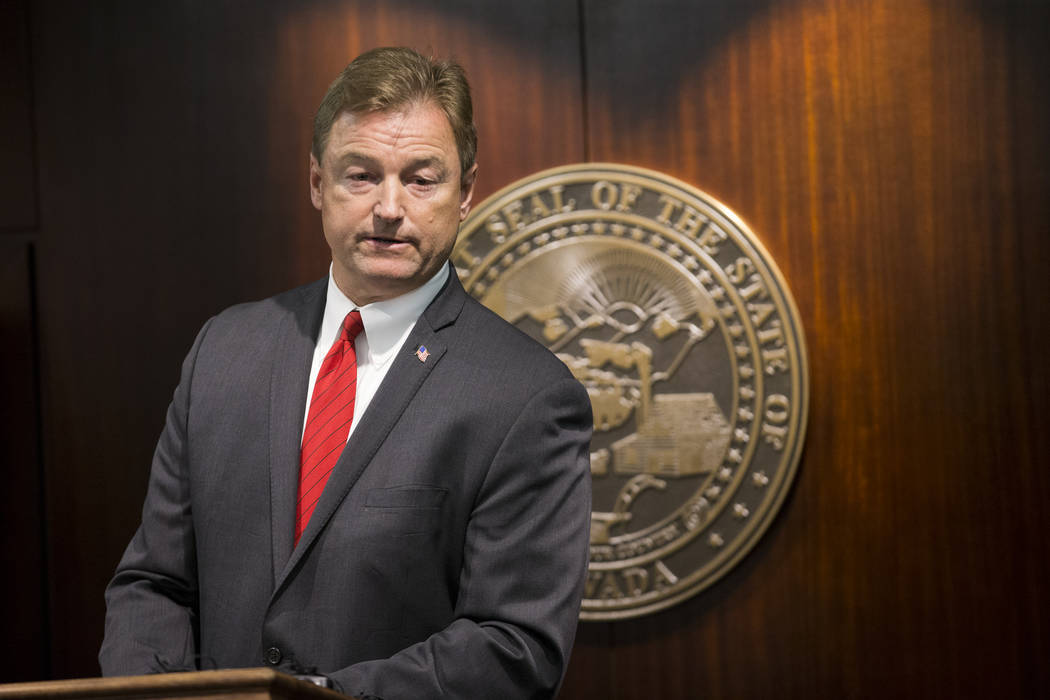
In the Seattle Times, the headline is “Nevada Sen. Dean Heller is the man to watch on health bill.”
In New York magazine, it’s “Republicans Confident Senator Dean Heller Will Be ‘Bought Off,’ Pass Trumpcare.”
Fox: “All eyes on Nevada’s Republican senator mulling ObamaCare decision.”
Patheos: “Better Care Recovery Act II: Dean Heller Highwater.”
Daily Kos: “Dean Heller? It’s on you now!”
How did Heller let this happen? Why is the whole nation watching him to learn if the Republican health care bill will pass the Senate?
There’s a famous story about George McGovern.
In the mid-1960s, organized labor badly needed his vote on an all-important measure – shutting off a filibuster (a real one) on section 14b of the Taft Hartley Act. Labor had come to McGovern’s rescue in his last election, helping him win his Senate seat. But on 14b, he dithered.
The measure was unpopular in his home state of South Dakota but he genuinely wanted to help labor. Days passed and he took no stand. The vote was finally held and honestly, I can’t remember how he voted. By then, it didn’t matter. His indecision convinced both sides that his real convictions were not with them. He alienated both sides.
I once heard former Nevada lieutenant governor Sue Wagner say that the public will tolerate unpopular votes. The key, she said, is to take a stand and not try to play games.
Heller has been dithering now all year long, almost as badly as his political party. It is still mind-boggling that the Republican leadership did not have an alternative to the Affordable Care Act ready to go on the first day of this Congress.
Conservative columnist Mona Charen has asked, “Why did the Republican leadership not have an ObamaCare repeal-and-replace plan on the shelf and ready to go the minute the election went their way? Why didn’t they use the time since the law’s 2010 passage to craft the Republican alternative?”
Heller has had years to calculate his chess moves if this matter ever came around. How could he have bungled it so badly?
Granted, because people in D.C. tend to talk only to their ideological allies, Heller probably thought the public hated the ACA and was taken aback this year when crowds poured into the streets to defend it.
He was probably also boxed in by his fellow Nevada Republican, Gov. Brian Sandoval, who has argued that “210,000 people in my state” would likely be injured by the GOP health plan.
And he probably never dreamed that a Republican president would turn out to be such a bungler that he alienated the Republican Party.
National Review, the magazine founded by conservative William F. Buckley Jr., is now leading the conservative charge against Trump. Its senior editor, Jonah Goldberg, just penned a piece titled “The Benefit of the Doubt Is Gone.” Its columnist, Charen, wrote 16 difficult-to-believe items people must swallow in order to believe Trump is the victim of a witch hunt.
Still, this late in the game, it is nearly impossible to discern what Heller REALLY believes about health care. All has been political calculation. He said at one point he was trying to “get to yes,” which could mean he was hoping to get a policy change or could mean he was trying to please the Republican leadership.
Slate described it well: “It’s peculiar that Heller, for example, would be undecided on the motion to proceed now, after the Medicaid cuts prompted him to unload on the bill and come out as a no on the last bill’s motion to proceed. Those Medicaid cuts are still there. But after leaving [Republican leader Mitch] McConnell’s office Thursday, Heller described their conversation as ‘very, very good’.”
The matter may be settled by the time this hits print, but probably not. At the moment, the GOP leaders are trying to scrape together not enough votes to pass their bill, but enough votes to even debate it, thus extending Heller’s twist in the wind. Then the delay caused by Sen. John McCain’s surgery further extended Heller’s ordeal.
Dennis Myers is an awardwinning journalist who has reported on Nevada’s capital, government and politics for several decades. He has also served as Nevada’s chief deputy secretary of state.